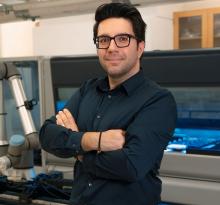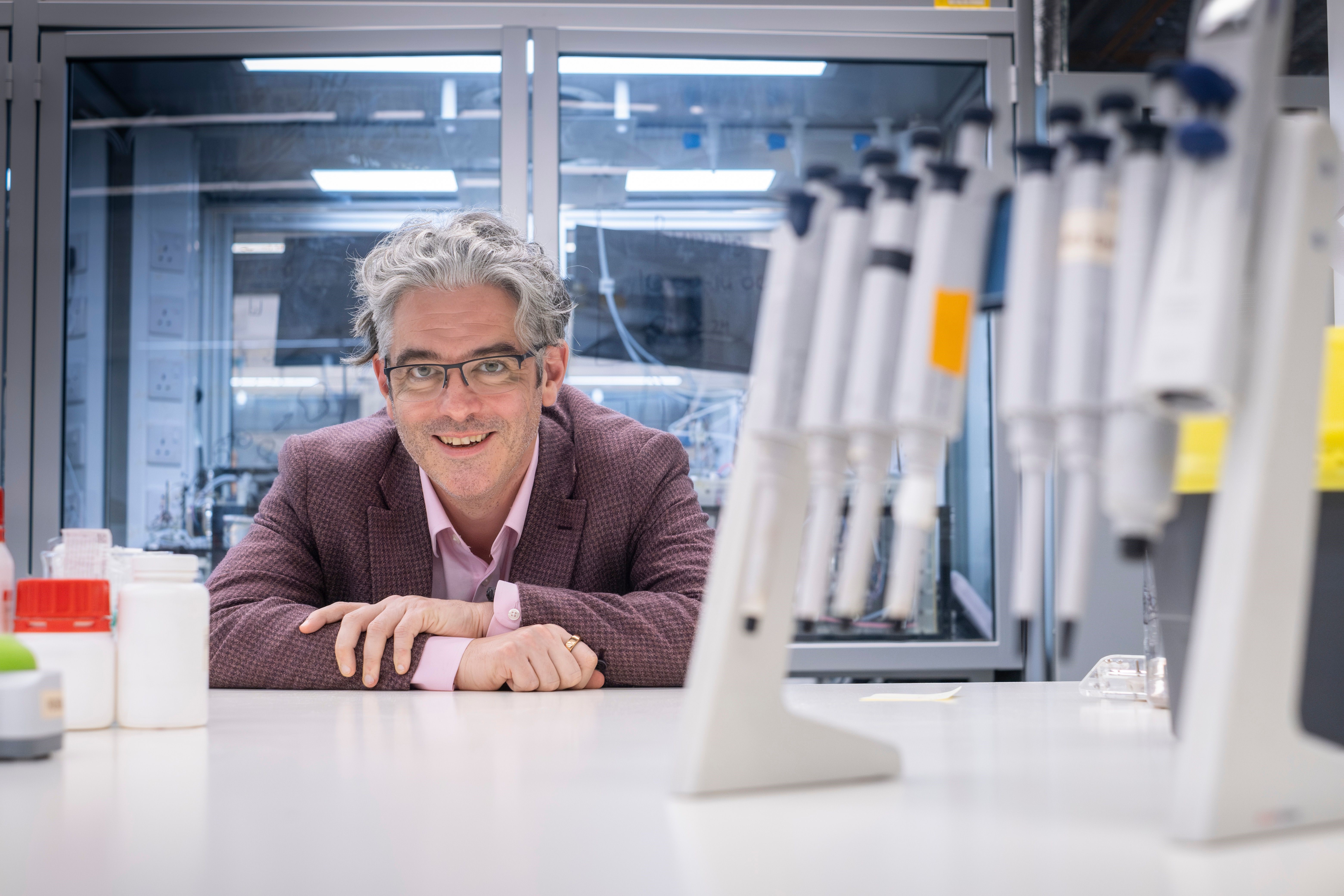Autonomous Science: From Fundamental Discovery to Real-World Impact
Autonomous Science Lecture Series at Pacific Northwest National Laboratory

Artificial intelligence (AI) is revolutionizing the way science is conducted, from automating experiments to enabling fully autonomous scientific systems. This rapidly growing area requires deep collaboration and communication across previously siloed areas of expertise.
This webinar series explores the latest advancements in AI-enabled autonomy for scientific discovery, featuring insights from experts in AI, robotics, and autonomous systems. Join us to discuss how AI-driven instruments, laboratories, and field deployable systems are transforming research and shaping the future of autonomous science, from fundamental discovery to real-world impact across a range of scientific disciplines, including energy science, critical materials, and Earth and environmental systems.
Each lecture will be followed by discussion, and engagement across scientific areas is highly encouraged. For those unable to attend, the lectures will be recorded and posted on this web page.
Organizing Committee
Upcoming Webinar Speakers
February 24, 2026, 12:00 p.m.
Register here
Connecting Theory and Experiment with Mat3ra.com
Timur Bazhirov, CEO, Mat3ra.com
Mat3ra.com is a data‑centric materials R&D platform that integrates physics-based approaches, such as density functional theory and molecular dynamics, and machine‑learning techniques with experimental data streams through a common set of FAIR, JSON‑based data standards and repeatable workflows. This presentation will first outline the architecture of Mat3ra.com and show use cases where automated high‑throughput simulations and interoperable data formats accelerate property prediction for heterogeneous interfaces and semiconductor‑relevant materials, building on prior work on data‑centric online ecosystems and model ontologies for computational materials science. I will then describe a collaborative theory–experiment case study with Prof. Sergei Kalinin’s group at the University of Tennessee, Knoxville, where Mat3ra was used to propagate modeling-based predictions into the interpretation of STEM measurements, demonstrating the potential for a closed‑loop refinement between simulations and laboratory data. Finally, I will discuss our open‑source Mat3ra Data Convention and related tooling for model and workflow categorization, and how these standards can interoperate with some of the efforts from the DoE national laboratories, such as Bluesky and related experimental data infrastructure to support reproducible multiscale simulations for future semiconductor and quantum materials devices.

Timur holds a Ph.D. in Physics from the University of California at Berkeley and has been the CEO of Exabyte Inc. since its inception in 2014 pioneering the field of Materials Informatics / AI for Materials R&D. Mat3ra.com (the product of Exabyte Inc.) is a cloud-based platform enabling materials scientists in energy, semiconductor, and manufacturing, to rapidly adopt and deploy a wide variety of digital techniques to develop new materials faster. The company is funded by Tim Draper, the Peter Thiel foundation, as well as AFWERX/Air Force Ventures. Mat3ra has dozens of Global 2000 customers, including ENEOS, Merck KGaA, Toshiba, works with multiple governmental institutions, including NRL, AFRL, NIST, and allows 30,000+ scientists worldwide to collaborate and build intelligence accelerating the pace of materials R&D.
Previous Webinar Speakers
July 31, 2025, 1:00 p.m.
Data-Rich Autonomous Labs for Accelerated Materials Discovery
Milad Abolhasani, ALCOA Professor and a University Faculty Scholar, Department of Chemical and Biomolecular Engineering, North Carolina State University
Abolhasani will present recent advancements of autonomous fluidic labs that integrate modular flow reactors, real-time feedback from high-throughput in situ characterization, and AI-assisted decision-making to autonomously explore and optimize complex multi-step chemistries. These autonomous labs function as intelligent robotic co-pilots, capable of conducting more than 4,000 experiments per day, reducing materials discovery and development timelines from decades to mere weeks. He will discuss the autonomous synthesis of colloidal quantum dots (metal halide perovskites and II–VI/III–V) for next-generation photonic and energy applications, demonstrating precise control over composition, size, and optoelectronic properties.

Milad Abolhasani is the ALCOA Professor, a University Faculty Scholar, and the Director of the Graduate Program in the Department of Chemical and Biomolecular Engineering at North Carolina State University. He also serves as the Director of Accelerated Technologies within NC State's Integrative Sciences Initiative. He received his Ph.D. from the University of Toronto in 2014. Prior to joining NC State University, he was an NSERC Postdoctoral Fellow in the Department of Chemical Engineering at MIT (2014-2016). At NC State University, Dr. Abolhasani leads a multidisciplinary research group that studies self-driving labs tailored toward accelerated discovery, development, and manufacturing of advanced functional materials and molecules using fluidic micro-processors. Dr. Abolhasani has received numerous awards and fellowships, including NSF CAREER Award, Dreyfus Award for Machine Learning in the Chemical Sciences & Engineering, AIChE Allan P. Colburn Award, AIChE Catalysis & Reaction Engineering Early Career Investigator Award, AIChE 35 Under 35, Scialog Fellowship, AIChE NSEF Young Investigator Award, I &EC Research 2021 Class of Influential Researchers, and Emerging Investigator recognition from Nanoscale, Lab on a Chip, Reaction Chemistry & Engineering, and Digital Discovery.
September 15, 2025, 12:00 p.m.
Teaching a robot to synthesize energy materials
Shijing Sun, Associate Professor, Department of Materials Science & Metallurgy, University of Cambridge
Artificial intelligence (AI) and robotics are redefining how we discover and manufacture energy materials. By coupling automated experiments with AI-guided decision-making, self-driving laboratories promise to dramatically shorten the journey from computational materials design to real-world deployment. In this talk, she will highlight three complementary approaches to building autonomous research platforms, spanning synthesis techniques from organic reactions for flow batteries to the crystallization of metal-organic frameworks and the thin-film deposition of halide perovskite semiconductors. She will first discuss all-in-one robotic systems that integrate synthesis, characterization, and optimization to enable high-throughput exploration with robust, standardized workflows. Second, she will introduce a modular thin-film deposition platform, effectively a self-driving lab on a benchtop, that uses low-fidelity proxies for rapid feedback while coordinating multi-step processes across modules. She will also share our low-cost, DIY robot built from open-source hardware that democratizes access to autonomous experimentation and adapts to evolving research needs. Together, these strategies demonstrate how robotics and AI can augment human expertise, accelerating the synthesis and characterization of advanced materials and opening new pathways toward next-generation energy technologies.

Dr. Shijing Sun is an associate professor in the Department of Materials Science and Metallurgy at the University of Cambridge, and an affiliate faculty of the Department of Mechanical Engineering at the University of Washington. Her group develops self-driving laboratory platforms to accelerate the discovery and design of energy materials. She studied Natural Sciences and earned her Ph.D. in Materials Science under Prof. Anthony Cheetham at the University of Cambridge. She then completed postdoctoral training at MIT with Prof. Tonio Buonassisi, pioneering high-throughput synthesis and characterization methods for perovskite semiconductors, later advancing to Research Scientist and leading machine-learning-guided design of thin-film photovoltaics and optoelectronics. Before joining the University of Washington, she was a Senior Research Scientist at the Toyota Research Institute, where she led AI-powered research on batteries and fuel cells. Dr. Sun has authored 60+ publications, delivered 40+ invited talks worldwide, and serves as an Associate Editor for APL Machine Learning.
October 7, 2025, 12:00 p.m.
Automating scientific discovery at scale
Andrew White, Head of Science and Co-founder, FutureHouse

FutureHouse is a non-profit founded in 2023 to automate the intellectual tasks of science. We are automating each stage of scientific discovery - from hypothesis generation, data analysis, and literature search. We have announced our first major results on exceeding human level performance in summarizing and synthesizing literature, building a benchmark for biology tasks, and scientific agents in closed loop discovery. We have exceeded human level performance of experts in multiple tasks and recently released open source code and launched a platform to enable others to use these agents to accelerate protein design, literature research, disease-target interactions, and bioinformatics analysis. In this talk, I will review these results and give a general update on our progress, with specific results on automating synthesis of human knowledge, exceeding human level performance and frontier models with local models, and assessing the progress on frontier AI models for doing scientific tasks - like ether0, our chemistry reasoning model.
Andrew White is a researcher with over 50 peer-reviewed publications and books in LLMs, chemistry, explainable AI, statistical mechanics, and chemical engineering, and has received numerous awards, including junior investigator awards from the NSF and NIH. Andrew is an active member of the scientific community as a peer reviewer for over 30 journals, multiple national and private grant awarding institutions, and serves on the Chemical Sciences Roundtable at the National Academy of Science.
Janury 20, 2026, 12:00 pm
Quantum Chemputation
Lee Cronin, Regius Professor of Chemistry, University of Glasgow
Quantum chemputation is a new paradigm for accelerating molecular discovery. By harnessing quantum mechanics, we can simulate molecules with unprecedented accuracy and explore chemical space far beyond current limits. Inverse design then allows us to move from targeted properties directly to a molecular graph, closing the loop between desired function and candidate structure. Chemputation takes over from there, converting the graph into universal chemical code that can run on automated platforms to physically make the molecule. This integrated approach opens the door to true novelty, enabling the discovery of molecules and materials that could never have been imagined or synthesized before.

Lee Cronin is a Chemist. He is the Regius Professor of Chemistry at the University of Glasgow and the Founder & CEO of Chemify. He is known for his approach to the digitization of chemistry and developing digital-to-chemical transformation known as Chemputing which can turn code into reactions and molecules. He has also developed a new theory for evolution and selection called assembly theory which aims to quantify and explain how selection can occur in chemistry before biology. Lee is also exploring how chemical systems can compute, and what is needed for the evolution of intelligence, as well as designing a new type of computational system that uses information encoded in chemical reactions and molecules.